vatican
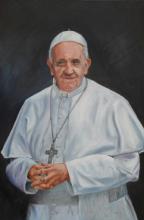
Pope Francis’ friendly letter to atheists, published this week by Italy’s La Repubblica newspaper, has been cheered by Catholics who welcomed another sign of the pontiff’s new openness to the world beyond the Vatican walls.
But it has also prompted some gnashing of teeth among others, who are reacting to headlines about the pope’s letter like this one in the British newspaper The Independent:
“Pope Francis assures atheists: You don’t have to believe in God to go to heaven.”
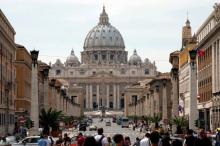
Pope Francis met for three hours with the heads of all Vatican departments on Tuesday, Sept. 10, signaling his desire to introduce more collaboration and transparency in the traditionally secretive and top-heavy governance style of the Catholic Church.
About 30 people attended, including the heads of the Vatican’s eight congregations and 12 councils, as well as top officials from the church’s tribunals and from the administration of Vatican state.
Cardinal Tarcisio Bertone, the Vatican’s outgoing secretary of state, also participated, in one of his last official engagements before his successor, Archbishop Pietro Parolin, takes over on Oct. 15.
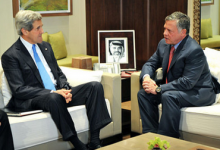
Pope Francis and Jordan’s King Abdullah II reaffirmed that dialogue is the “only option” to end the conflict in Syria, just as the United States and its European allies consider launching a military strike against the regime of President Bashar al-Assad.
The two leaders met for the first time on Thursday at the Vatican. The pontiff and the king, accompanied by his wife Queen Rania, talked in private for 20 minutes.
According to an official Vatican statement, during the meeting “special attention” was given to Syria’s “tragic situation.”
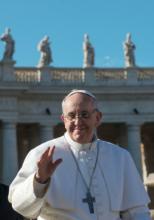
VATICAN CITY — Since mid-July, Pope Francis has been using Communion wafers made by an Argentine prisoner in the daily Mass he celebrates at the Vatican’s Santa Marta residence.
The hosts are made by Gabriela Caballero, a 38-year-old woman who is serving a seven-year jail term in the San Martin Penitentiary outside Buenos Aires.
Her story was revealed by the Argentine news agency NOVA and picked up by Il Sismografo, a blog with close connections to the Vatican.
Caballero gave the hosts, together with a long letter to the pope, to Bishop Oscar Ojea of San Isidro, who regularly visits the prison. Ojea, in turn, delivered the hosts to the pope on July 16 during a visit to the Vatican.
Francis began using the hosts on July 18; the day after he wrote back to Caballero, thanking her for the gift.
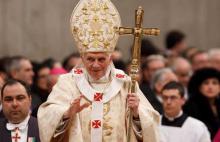
Pope Emeritus Benedict XVI resigned from the papacy because “God told me” to, according to a report by a Catholic news agency.
The Zenit news agency reported on Monday that Benedict decided to step back as a result of what he described as a “mystical experience” that shouldn’t be confused with a vision.
That experience sparked an “absolute desire” to dedicate his life exclusively to prayer, in a solitary relationship with God, Benedict reportedly said.
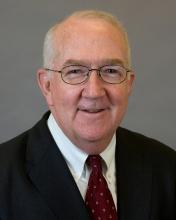
The U.S. Senate has confirmed former Catholic Relief Services head Ken Hackett to be the next ambassador to the Vatican.
Hackett replaces Miguel Diaz, a theologian, and he gives President Obama an experienced voice on social justice in Rome where a new pope, Francis, has made caring for the poor a priority.
Hackett’s confirmation came Thursday night by unanimous consent as senators wrapped up loose ends before the summer recess.
No opposition was expected since Hackett has strong ties to both parties; for five years he served on the board of former President George W. Bush’s Millennium Challenge Corporation and he is reported to be close to Denis McDonough, Obama’s chief of staff, whose brother is a priest.

For Catholics—and many others—what happens in Rome doesn’t stay in Rome. The seating of a new pope has the power to affect believers across the globe, in ways direct, indirect, and unpredictable. And when a surprising sea change occurs in a hide-bound, steeped-in-tradition place like the Vatican—the unexpected resignation of a pope, the selection of a Jesuit from the Americas as his replacement, and the powerful symbolism of a new leader who literally stoops to wash a Muslim woman’s feet—people of faith of all traditions sit up and take notice.
In these early days of Francis’ papacy, we asked three prominent Catholic thinkers and leaders to help us understand what it all might mean. How will the spirit of reform that has marked Pope Francis’ first few months in office affect the worldwide church? Will change at the top trickle down to parishes and neighborhoods here in the United States and elsewhere? And what will Francis’ leadership mean not only for Catholics, but for all people of faith engaged in the work of making justice and building peace? —The Editors
CATHOLICS AROUND THE WORLD are transfixed by Pope Francis. We love his simplicity of life, his humble faith, his welcoming attitude to all, and his way of being Christian in the contemporary world that takes its bearings from the poor. Lace and gilt are no longer fashion statements at the Vatican. From his small apartment, the pope speaks bluntly about worrying less about rules and more about love. An utterly refreshing breeze blows through the Catholic Church.
But what does it really mean for Catholics today? The church still reels with the moral and spiritual damage done by members of the clergy as perpetrators or accomplices in the sex abuse scandals, from fiscal mismanagement, and from institutional infighting. Does Pope Francis change that? And what does the new pope signify for the young, for women, and for the many issues that vex the church’s engagement in today’s world?
Pope Francis announced Monday in an airborne news conference that he’s ‘not one to judge’ the sexual orientation of Catholic priests. On his journey home from Brazil, Pope Francis declared open-mindedness by sharing his support on behalf of the gay community. The Washington Post reports:
“If someone is gay and he searches for the Lord and has good will, who am I to judge?” Francis asked.
Read more here.
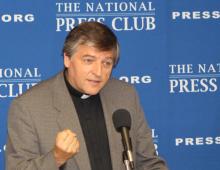
An Austrian priest who’s been banned from speaking at Roman Catholic churches during his three-week U.S. tour said Pope Francis could be an ally in reforming the Catholic Church, but said it will take more than the pope to open the priesthood to married men and women.
The Rev. Helmut Schuller, founder of the Austrian Priests’ Initiative, has been drawing crowds of several hundred people with his call for greater participation from the church’s lay “citizens” and a married priesthood.
“We are trying to open the church to a real approach to modern society,” Schuller said Monday in a speech at the National Press Club. “There are a lot of questions to our church in these times, and the answers are really old-fashioned.”
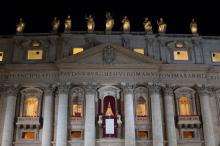
Pope Francis on Thursday approved a major overhaul of the Vatican’s criminal laws, introducing specific offenses for child sexual abuse and leaking confidential documents.
Vatican laws against money laundering, corruption, and the financing of terrorism were updated to respond to the recommendations of the European financial transparency watchdog Moneyval. The Vatican submitted to Moneyval oversight as part of its bid to use the euro as its currency.
Under the new norms, which will go into effect on Sept. 1, the Vatican also abolished life imprisonment, substituting a maximum jail term of 30 to 35 years.

Pope Francis declared on Friday that Popes John Paul II and John XXIII will be made saints, elevating the two most decisive popes of the 20th century to the pantheon of Catholic life and worship.
In a sign of the worldwide devotion for John XXIII, known as “Good Pope John,” Francis waived the requirement for a second miracle credited to John XXIII’s intercession, with the Vatican’s spokesman saying, “no one doubts his virtues.”
Francis signed off on a decree recognizing the second miracle attributed to the Polish-born John Paul II, who reigned from 1978 to 2005 , and is credited with globalizing the papacy and playing a key role in the downfall of the communist regimes of Eastern Europe.
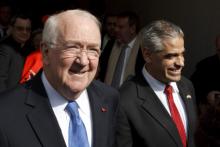
President Obama on Friday nominated Ken Hackett, former head of Catholic Relief Services, to be the next U.S. ambassador to the Vatican.
It’s a savvy move, picking a Catholic whose career in the church has been dedicated to alleviating suffering as America’s representative to a pope who has made helping the poor a priority for his pontificate.
Hackett replaces Miguel Diaz, who left the post last November to teach at the University of Dayton. Diaz is a theologian, which was a first for the U.S. ambassador to the Holy See, and that also seemed to make sense in that Pope Benedict XVI, whose retirement led to the election of Pope Francis last March, is a renowned theologian.
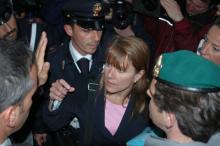
A campaign to hold former Pope Benedict XVI responsible for crimes against humanity floundered on Thursday as the International Criminal Court in The Hague threw out a case filed by victims of clergy sex abuse.
The case had been presented in September 2011 by SNAP, the Survivors Network of those Abused by Priests, and the New York-based Center for Constitutional Rights, accusing the pope and other senior Vatican officials of failing to stop abusive priests.
According to a SNAP statement, the court’s prosecutor’s office said on May 31 that the file presented against leaders of the Roman Catholic Church does not meet the “preconditions of the court” and thus “do not appear to fall within the (court’s) jurisdiction.”
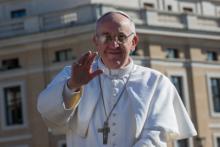
When Pope Benedict XVI shocked the world in February in becoming the first pope to resign in 600 years, he left behind a Roman Catholic Church weakened by scandals, beset by infighting and suffering from a general sense of isolation from the modern world.
Three months after the election of Argentine Cardinal Jorge Bergoglio as Pope Francis, much of the gloom seems to have lifted.
St. Peter’s Square is again a magnet for legions of pilgrims, and the communications problems that dogged Benedict’s papacy have receded. Francis’ simpler, direct style, together with his focus on the poor and the marginalized, has captivated the world.
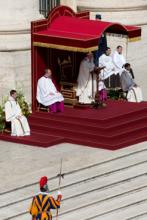
Pope Francis on Wednesday denounced consumerism and what he called the “culture of waste” of modern economies, especially when it comes to food.
“Throwing away food is like stealing from the table of those who are poor and hungry,” he said during his weekly audience in St. Peter’s Square.
His words came on the day the United Nations launched an anti-food waste campaign to mark World Environment Day.

Pope Francis is warning Catholics not to demonize those who are not members of the church, and he specifically defended atheists, saying that building walls against non-Catholics leads to “killing in the name of God.”
“(T)his ‘closing off’ that imagines that those outside, everyone, cannot do good is a wall that leads to war and also to what some people throughout history have conceived of: killing in the name of God,” Francis said Wednesday in remarks at the informal morning Mass that he celebrates in the chapel at the Vatican guesthouse where he lives.
“And that, simply, is blasphemy. To say that you can kill in the name of God is blasphemy.”
Francis explained that doing good is not a matter of faith: “It is a duty, it is an identity card that our Father has given to all of us, because he has made us in his image and likeness.”

For centuries, popes sponsored the work of artists such as Michelangelo, Raffaello, or Bernini, who went on to create some of their masterpieces within the very walls of the Vatican.
Yet over time, the marriage between art and faith grew stale — the Vatican’s culture minister even called it a “divorce” — with the Roman Catholic Church finding itself estranged from the art world it did so much to create.
Now, in a bid to revive its ancient tradition of arts patronage, the Holy See will participate with its own pavilion at the 2013 Venice Biennale, a leading international arts festival.
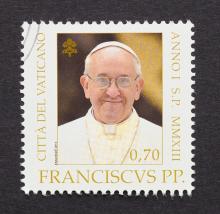
I WAS 15 when Pope Paul VI died in 1978. He’d been pope my whole life. Elated at the election of John Paul, I followed his papacy with all the obsessive focus of a teenager. When he died 33 days later, I simply didn’t know what to think. (His book Illustrissimi, a collection of letters written to saints, novelists, and artists, is one I return to for insight on Catholic imagination.)
During John Paul II’s 27 years as pope (the second longest reign in papal history), a dangerous nostalgia for a pre-Vatican II church was encouraged to flourish.
Under Pope Benedict XVI, that nostalgia came to fruition. The Latin Mass was re-established in many parishes. Amid a worldwide sex abuse scandal, liturgical correctness and “fancy dress” were too often elevated over children’s protection, victims’ needs, and institutional transparency. Women and girls were pushed further off the altar. To be gay, female, divorced, or a single mother—all these pushed one further from the table of the Lord, rather than drawing one nearer.
And now we have Pope Francis. When Jorge Mario Bergoglio announced he would take the name Francis, after Francis of Assisi, I wept. To have the Poverello (the “poor one”) at the center of our Catholic faith is right and just—whether that poor one is a 13th century itinerant preacher or a child in the villas miseria around Buenos Aires.
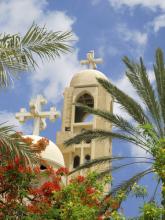
Pope Francis on Friday met with Pope Tawadros II, head of Egypt’s Coptic Orthodox Church, an encounter that brought the number of popes within the Vatican walls to three this week.
Benedict XVI, the emeritus pope, returned to the Vatican on May 2, two months after his resignation, while Tawadros is only the second Coptic pope to visit the Vatican, after the historic visit of Pope Shenouda III to Pope Paul VI in 1973.
Tawadros — on his first foreign trip since he was elected in November — is staying at the Vatican’s guesthouse where Pope Francis is also living. Benedict is now living in a revamped convent a 5-minute walk away, but there were no plans for the two men to meet.
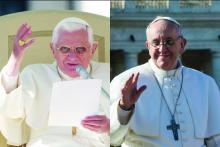
More than two months after his resignation, Pope Emeritus Benedict XVI will return to the Vatican on Thursday to live in a small convent that has been recently renovated for his needs.
Benedict’s return will face the Vatican with the unprecedented situation of a reigning pope and a retired pope living a short distance from each other.
The potential difficulty is compounded by the fact that Benedict’s personal secretary, Archbishop Georg Gaenswein, will move in with the former pope while he continues to serve as Pope Francis’ Prefect of the Papal Household, charged with setting his schedule and audiences.